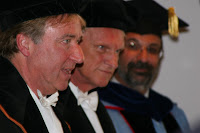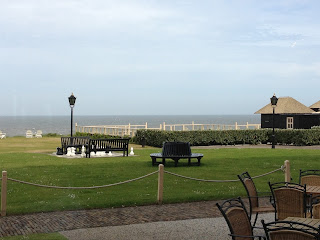 |
| Boat off the Noordwijk coast pumping sand to reinforce the beach |
It’s June. My Fulbright
scholarship was complete two weeks ago. I’m in the Netherlands at a conference
in Noordwijk. Between the last post about Paris and now, I did some more work
in Amsterdam, said some goodbyes, then went on two wonderful weeks of vacation
with Sandy visiting Paris, Florence and Siena; then a couple more days in
Amsterdam including the doctoral defense of Lotte Willemsen, a very bright
young scholar who has become a good friend. Today is my last day in this
country, for now.
 Since my return from CELSA in Paris,
things were quite a whirlwind. There were only a couple of days in which to
pack up my belongings and prepare to leave the apartment on Geldersekade. In
that time, my colleagues from Duisburg, Germany--Stephan Winter, German, and
Sabrina—came to work with Sarah van der Land and me to make adjustments, curricular
decisions, and further coordination for a course we will be teaching next fall
on virtual collaboration. The course will involve students from each of our
universities (Michigan State University, University of Amsterdam, and University
of Duisburg-Essen) working together online.
Since my return from CELSA in Paris,
things were quite a whirlwind. There were only a couple of days in which to
pack up my belongings and prepare to leave the apartment on Geldersekade. In
that time, my colleagues from Duisburg, Germany--Stephan Winter, German, and
Sabrina—came to work with Sarah van der Land and me to make adjustments, curricular
decisions, and further coordination for a course we will be teaching next fall
on virtual collaboration. The course will involve students from each of our
universities (Michigan State University, University of Amsterdam, and University
of Duisburg-Essen) working together online. 
 Later I went out with Jochen, Patti,
Peter, Dian, Maria, Sarah, and Lotte to celebrate our time together in Amsterdam. Given it
was beer week in Amsterdam, we did what the occasion demanded. They gave me
some lovely gifts, including a bag with the CCAM logo, and another bag picturing the
new Dutch king and queen (of whom I seemed to become a fan on Queen;s Day.
Later I went out with Jochen, Patti,
Peter, Dian, Maria, Sarah, and Lotte to celebrate our time together in Amsterdam. Given it
was beer week in Amsterdam, we did what the occasion demanded. They gave me
some lovely gifts, including a bag with the CCAM logo, and another bag picturing the
new Dutch king and queen (of whom I seemed to become a fan on Queen;s Day.
Earlier, Patti and Jochen and I had met
in Patti's new office at the UvA’s main building that accompanied her ascension
to university professor--a beautiful room in a grand location--to review the projects we had started and the essays
we plan to undertake together. Jochen suggested we need to identify the central
characteristics of computer-mediation that fundamentally affect communication. I
agreed but added that we may need to articulate the fundamental processes of
communication as a requisite. One of our upcoming endeavors includes re-examination
of some basic communication models to deal with new technology, interactivity,
and the precepts of their differential susceptibility model of media effects.
This will be a challenging undertaking for us, but one which I am eager to
explore. We also have a review to work on together to describe mass media
research in contemporary life for a major journal. Other experiments continue
in the planning or refinement stages, and we are making plans for additional
collaborations and meetings. These colleagues continue to argue together with
me. They have high standards, they speak well and listen well, and they laugh
easily. They have been valuable teachers to me and have become precious
friends.
 That Saturday Sandy came from America and
we joyfully reunited again. We visited the Saturday market that had become my
custom to visit to procure delicious snacks. We said goodbye to the meat guys,
the cheese guys, the woolen socks guy, and others. They were kind and we took
some pictures together, and exchanged names for the very first time. I will
miss Saturday mornings in Amsterdam very much.
That Saturday Sandy came from America and
we joyfully reunited again. We visited the Saturday market that had become my
custom to visit to procure delicious snacks. We said goodbye to the meat guys,
the cheese guys, the woolen socks guy, and others. They were kind and we took
some pictures together, and exchanged names for the very first time. I will
miss Saturday mornings in Amsterdam very much.  We returned from vacation two weeks later for Lotte’s dissertation defense. Once again, I
got to wear my regalia and follow the guidelines that Peter Neijens taught me
the first time I participated in such a defense in 2004: Take your hat off when
you sit down, put your hat on when you stand up, and try to keep your question
under 5 minutes. I told Peter, those are good rules for life!
We returned from vacation two weeks later for Lotte’s dissertation defense. Once again, I
got to wear my regalia and follow the guidelines that Peter Neijens taught me
the first time I participated in such a defense in 2004: Take your hat off when
you sit down, put your hat on when you stand up, and try to keep your question
under 5 minutes. I told Peter, those are good rules for life!
After robing and completing our preliminary discussion, as the professors
left the meeting chamber we passed by a large rope hanging from a hole in the
ceiling. Perhaps it was once to ring the bell of the chapel in which the event took
place. Prof. Claes de Vreese saw me looking at it and told me it was for the students who did not pass
the defense. (I had to think a moment to envision the hanging he was joking
about.)

 Lotte answered my question well about the implications of her results
for classic theories of communication and social influence. The other questions
and answers were in Dutch, and my distinguished colleagues found them to be
good as well.
Lotte answered my question well about the implications of her results
for classic theories of communication and social influence. The other questions
and answers were in Dutch, and my distinguished colleagues found them to be
good as well. 
What did you learn here, Sarah van der Land had asked me
one morning in May as she showed me Amsterdam’s northern side across the Ij river.
Academically, I learned about the role of certain kinds of constructs in
communication theories' investigations, that has already changed the way I do
research and what I will teach graduate students. I learned more about
connecting our research foci to contemporary societal issues in the manner that
my new colleagues have done so effectively and successfully, and how doing so
can open a door to theories' limitations, nuances, and needs.
I learned that questions I have mulled over about how to do my job, others have asked themselves the same questions,
and when we compare these thoughts aloud we see find we have similar issues
about how we spend our work time, how many and what kind of students are best
to advise, and such. Maybe we will improve our approaches now that we have surfaced our challenges.
I learned I can lecture to students who
have different participation styles and orientations to the classroom, and do
so successfully enough.
I have re-learned the warmth and energizing
effects of the good company of bright scholars and confidants with whom I look
forward to an ongoing relationship. I think it will not take too much longer
than the time it takes to recover from jet lag before I start dreaming up plans
to return to Amsterdam.
I learned about myself through this experience that, as you may have read, I carry a lot of stereotypes with me and I project a number of them to others. I have also been able to examine how easy it is to get other people to move from a stereotyped to a somewhat more interpersonal encounter sometimes. It is not too difficult to maintain eye contact a little longer than expected, to make an effort to express gratitude an extra time, to make a joke or offer a personal observation, or in other ways to violate expectations in a simple enough way.
For instance, when I asked the waitress in
Siena whether she had said the steak would be 500 grams or 500 Euros, first
she answered seriously, then she smiled at how obviously dopey a question it was. By the
end of the evening she sat at our table with us. To get someone to smile, rather than respond to my accent in an indifferent manner, is fun.
I have enjoyed being a
visitor, and being a European, too. I love the food and the quality of life here, the good company, and how so many people here know a craft—from making research to making
sausages—that they do well and take seriously.
I am looking forward to home, for lunch at Bell's with Ron and Bill, dinner with Sandi, Maria, and Kami, and summer cookouts (with better weather) outside my big American house, with my sweet American wife, to re-engage with my international cohort of students, and a family reunion in California this August. But I am also quite sad to go, and very eager to return.
Off to London today where
some unusual events await at the International Communication Association
conference. I’ll describe them in the next post.
 |
| Noordwijk... |
 |
| ...aan Zee |





No comments:
Post a Comment